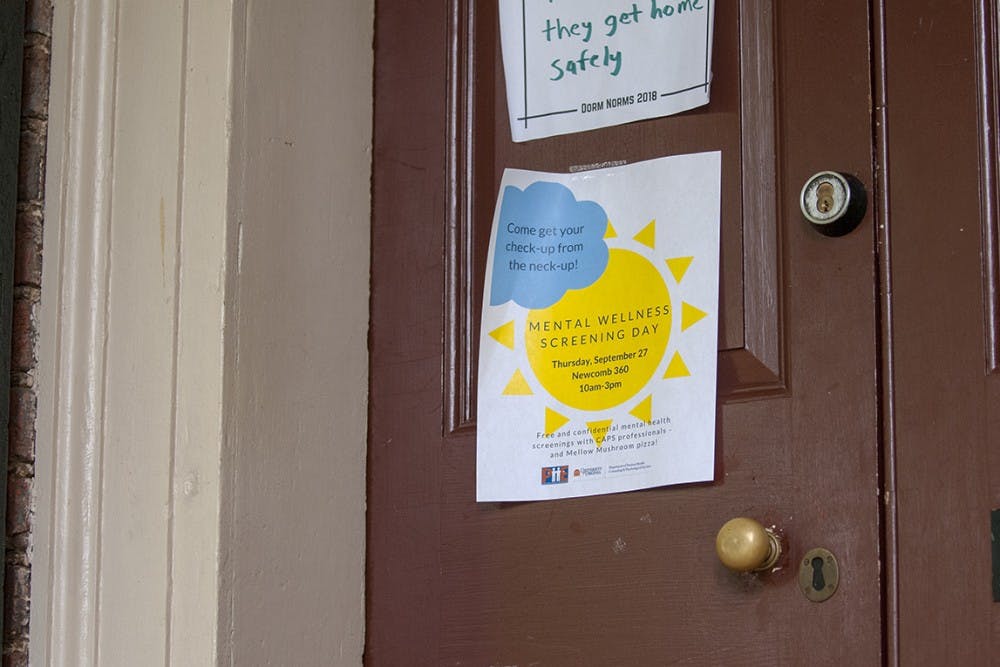The Elson Student Health Center will host its fall Mental Wellness Screening Day Thursday in Newcomb Hall Room 360. The event — funded by Student Health — seeks to raise awareness of mental health and increase the accessibility of the University’s Counseling & Psychological Services for students.
Students will be able to receive free mental wellness screenings from CAPS professionals throughout the day, and can remain anonymous. To preserve the anonymity of students, individuals will be registered by number rather than name.
After their screening, students seeking further assistance will be walked through the process of scheduling appointments at CAPS and given contact information for medical professionals who may be helpful for their specific case. They will also be walked through the process of setting up a phone screening and given the information for accessing urgent care.
In planning the event, Student Health is partnering with Peer Health Educators, the student wing of the Office of Health Promotion.
Fourth-year College student Jessie Amick, an events intern at the Office of Health Promotion, said the screening is more accessible for students.
“When I hear why people don't go to CAPS … A lot of the reasons that people come up with are things that Mental [Wellness] Screening Day actively addresses,” Amick said.
Issues such as distance, appointment wait time and approachability were among the issues Amick listed that can deter students from individually approaching CAPS for treatment.
“Mental Wellness Screening Day actively tries to combat some of those issues by bringing it to them,” Amick said.
As is with CAPS counseling, students pay no fee for a screening. The only costs of the event are for pizza and copying, both paid for by Student Health. According to Leonard Carter — CAPS crisis coordinator and a screening day organizer — Student Health spends an average of $200 to $300 on the event each semester.
Screening day began in 2001. Carter said the numbers of students screened has increased from 20 in 2001 to an average of 135 to 180 individuals in the last three fall sessions. Student Health expects the number to increase.
“Certainly, we’re seeing our numbers increase every year, and I think there's a variety of reasons for that,” Carter said. “I think one reason is the reduction of stigma — I think people are a little more willing to reach out … And get help.”
While the screenings take place simultaneously in the same room — creating the potential for privacy issues — Carter said CAPS does everything they can to ensure the most amount of privacy for the student in the space provided. Efforts include talking quietly and having screenings away from other students in the room.
“I would not pose it as something ideal but — on the other hand — people can get a quick mental health screening, [and] they can talk to one of us from CAPS,” Carter said.
Student Health hosts the event once a semester in order to provide a regular resource to students.
According to Carter, many students who are screened at the event continue to receive the help they require at CAPS.
“Certainly, over 17 years, I’ve gotten a few emails from students where they felt like this really made a huge difference for them,” Carter said. “People who had untreated depression, thoughts about suicide — they were able to come in here, get treatment and experience a lot of improvement — and then have a much better experience at U.Va.”
Assoc. Psychology Prof. Noelle Hurd emphasized the importance of early detection in an interview with The Cavalier Daily.
“Early detection can be really important for a variety of mental health issues,” Hurd said. “Obviously, depression and anxiety are the most common issues we see, especially among college students.”
Both Carter and Hurd said that mental illness can be treated and overcome.
“As mental health professionals, we are trying to help people identify and figure out the best ways to treat and manage mental illness, so that it isn't this disability — so that it isn't something that prevents them from living a whole and healthy life,” Hurd said.
Carter stressed the importance of the event in connecting students with the help they need.
“I think the event does directly benefit a lot of people in the community because I think this is a way for students to have that first contact with CAPS, that first contact with mental health in college,” Carter said.







